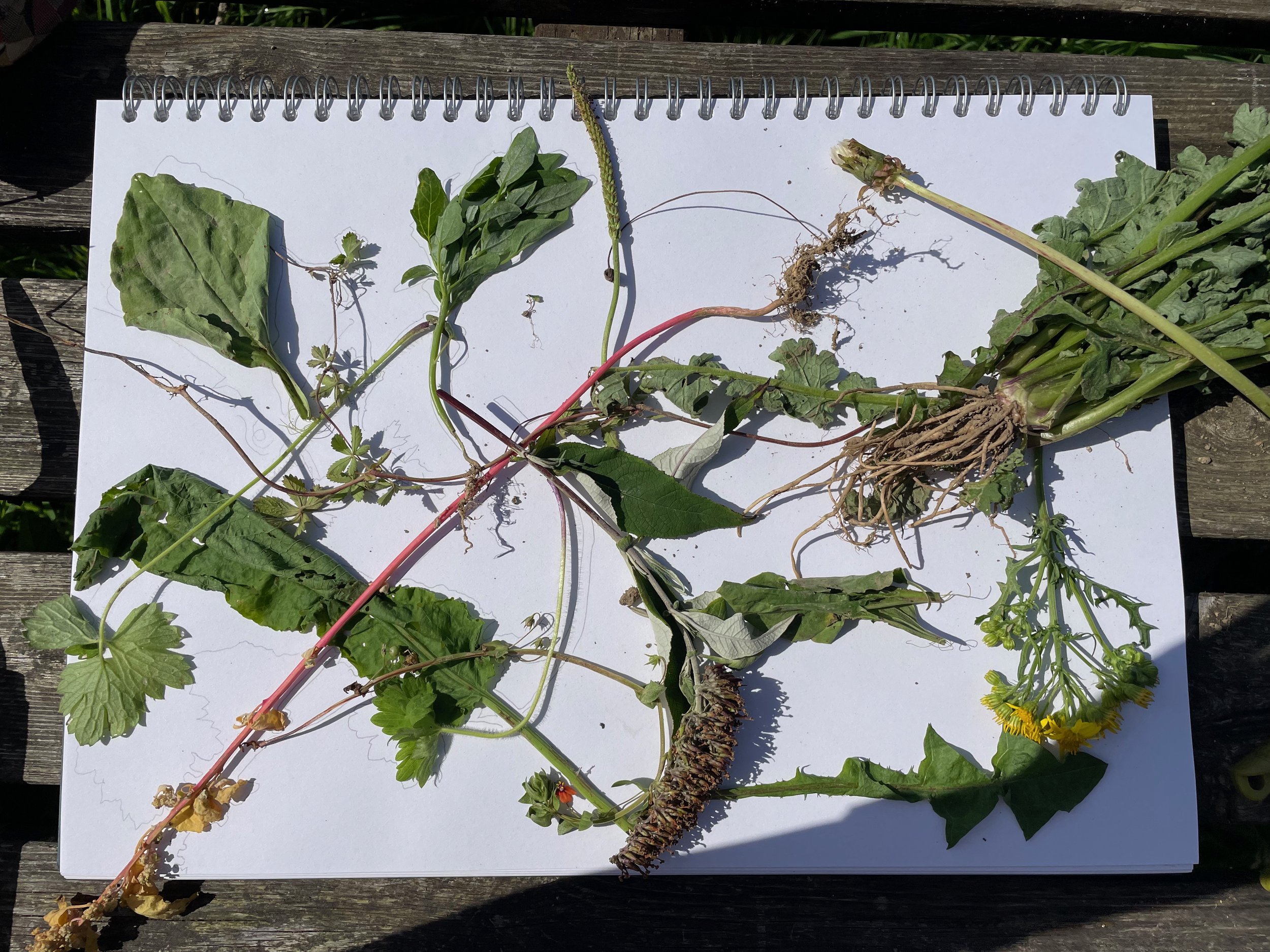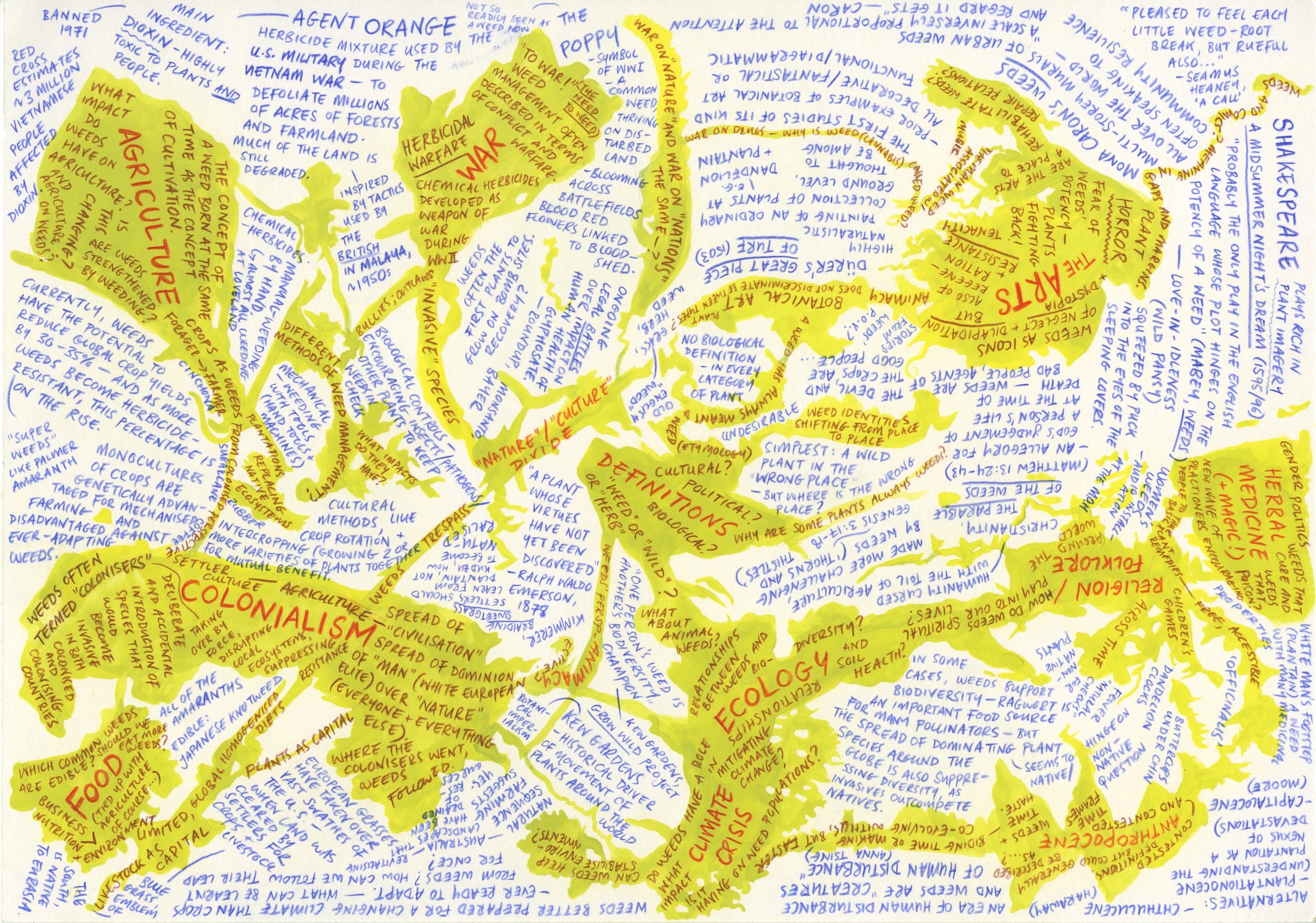There is a field that rolls, lush and green, down a hillside to a forested riverbank just outside the town of Penryn, Cornwall. The field is called Loveland, and it is home to a community agro-ecology project. Since autumn 2020, volunteers have gathered at Loveland to grow food and flowers in accordance with practices that balance give-and-take between people and the land, to the benefit of both.
The path leading from the riverbank up to Loveland, photographed in July 2022
I started volunteering at Loveland in February 2022, a few months into my MA at Falmouth University. I very quickly fell in love with the field, and sought to spend as much time there as I could, learning about agro-ecology in action and enjoying becoming a part of the vibrant and caring community. This experience inspired me to turn the focus of my MA practice towards exploring the relationships between human beings and other living beings, particularly within food-growing contexts — the relationships on which all our lives depends, but which for many of us are marginalised or distorted, allowing for neglect and abuse.
This exploration has led (and continues to lead) me far and wide: through channels of colonial theory and Indigenous scholarship on animacy - the pulsing, interconnected sentience of all living beings; towards outposts of comic studies that consider the medium’s capacity to tap into the bends of time and space, and envision more-than-human perspectives; and along growing branches of anthropology that are probing through the artificial barriers that wall in the “human” from everything else. (I hope to make time to write here about these wanderings and encounters in more detail soon.)
A compound drawing of weeds at Loveland - bitter dock, dandelion, scarlet pimpernel, common plantain (or ‘white man’s footstep’), willow herb, ragwort, buddleia, creeping buttercup…
Weeds are one gathering point for this exploration. Born of the human-made (Western, Colonial, Christian) division between “Man” and “Nature”, “Domesticated” and “Wild” and now forever trespassing - sometimes quietly, sometimes violently - across it, weeds have a lot to say about relationships between living beings. Particularly within agricultural settings, weeds present a reminder that no interaction between human beings and other living beings is ever one-way or self-contained. Attempts to control or eradicate one plant, insect, fungus, or ‘pest’ of any other form, will always have consequences for another life or lives, often including our own. Disregarding or forgetting this sows trouble.
Loveland’s Weeds was my final MA project, with which I just dipped my toe into this vast subject. The project comprises six postcard comics - each presenting an excerpt of a conversation had at Loveland about weeds - and a “map” charting the field of questions and tentative responses I explored both during and in the lead up to the project.
The decision to work with the comic form had been made before I got going with Loveland’s Weeds, as part of the research I had started into comics’ potential to embody a visual ‘grammar of animacy’ (I’m hoping to write a separate post on this soon), but I also detected a sympathy between comics and weeds - both are marginalised yet ubiquitous, and activated by the imposition of borders. Then, I chose the postcard format for a number of reasons: having limited space helped to contain what is quite an unwieldy theme, while also leaning on the association between the postcard form and a sense of brevity, summary, snapshot - this project was not aspiring to be comprehensive; postcards are representative of travel, and travel and migration are essential to the discussion of weeds; and, finally, the entangled history of postcards and empire - postcards, a relatively new medium at the time, were popular souvenirs at the late nineteenth and early twentieth century “world fairs”. Meanwhile, the landscape of the map is lifted from the traced outline of some of Loveland’s actual weeds - leaves, flowers and roots of dandelion, dock, ragwort, and others.
The six Loveland’s Weeds postcards. You can see three of the postcard comics in detail, with accompanying discussion, on the Work page.
Leaves, roots and flowers of dandelion, buddleia, ragwort, dock, plantain, and more - traced to create the weed map (below)
The map of themes, questions, and tentative responses that contained the Loveland’s Weeds project.
The postcards and map were displayed in the final MA exhibition alongside multiple portraits of Lovelanders - both people and plants alike - written questions and ideas about weeds, and a fridge on a plinth, containing produce grown at Loveland. For pictures and more details about the show, please see the dedicated post.
_____
I don’t think I’m finished with weeds yet, and I’m certainly not finished with researching - through traditional and practice-based methods - the potential of comics as a visual ‘grammar of animacy’. I am also, despite being in the process of moving back to London, never going to be finished with community agro-ecology projects. I’m looking forward to getting stuck into learning about and experiencing urban food growing projects.
None of this would have happened if it weren’t for Loveland - the brilliance of the people, in collaboration with the abundant plants and pollinators and soil microbes and more, who have cultivated it, and whose generosity fed this project. I have planted a little piece of myself there, and I can’t wait to return soon to see how it has grown.
To everyone at Loveland, I say “thank you” with my heart and belly full.
———
Loveland is part of the Falmouth Food Coop (FFC), along with the Grocery and the Kitchen. The Grocery supplies the community with the opportunity to buy local, organic produce at affordable prices, and the Kitchen cook up free meals once a week for people in the community who need extra support. To learn more about Loveland, and the FFC on the whole, visit the FFC’s website.
If you have any thoughts or questions about anything I’ve written here, please don’t hesitate to leave a comment or get in touch with me via the contact form.





